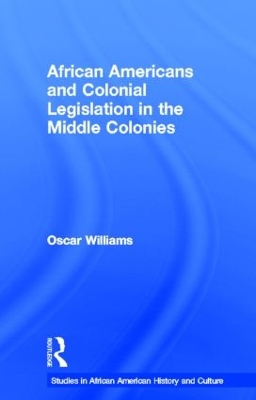Studies in African American History and Culture
1 total work
African Americans and Colonial Legislation in the Middle Colonies
by Oscar Williams
This study analyzes legislation governing black life in New York, New Jersey, and Pennsylvania. The years from 1664 to 1712 witnessed the formative era of slavery in the middle colonies, and by the beginning of the 18th century, specific laws governing African Americans were passed. The long range effects of the Insurrection of 1712 (which took the lives of nine whites and critically wounded five others) and the Negro Conspiracy of 1741 produced extensive slave codes in New York and New Jersey. Pennsylvania took the more subtle approach of high tariffs, starting a tariff war against slavery.
Free blacks suffered under the harsh slave codes, as laws which restricted the movement of slaves also restricted the movement of free African Americans. Slaves were considered property protected by law, but free blacks were denied even this minor protection. Fear of insurrection led New York City, Albany, and Philadelphia to pass restrictive legislation. The greatest obstacle to freeing slaves was legislation requiring manumission bonds. As a result of a diversified economy, African Americans performed virtually every type of labor in the frontier communities of the middle colonies, and developed more skills than their southern counterparts. Eventually, the influx of whites provided cheap day labor that reduced dependency upon slave labor.
(Ph.D. dissertation, Ohio State University, 1969; revised with new preface and foreword)
